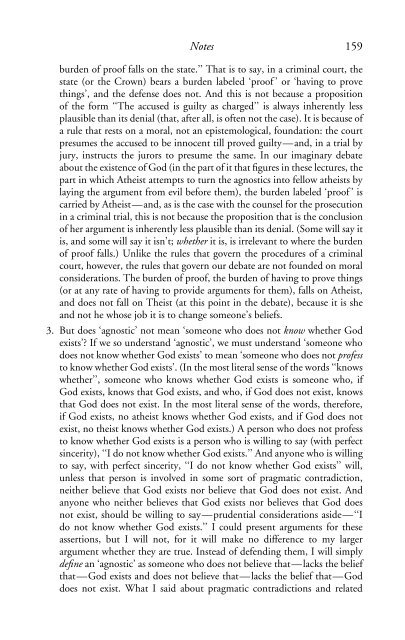The Problem of Evil - Common Sense Atheism
The Problem of Evil - Common Sense Atheism
The Problem of Evil - Common Sense Atheism
You also want an ePaper? Increase the reach of your titles
YUMPU automatically turns print PDFs into web optimized ePapers that Google loves.
Notes 159<br />
burden <strong>of</strong> pro<strong>of</strong> falls on the state.’’ That is to say, in a criminal court, the<br />
state (or the Crown) bears a burden labeled ‘pro<strong>of</strong> ’ or ‘having to prove<br />
things’, and the defense does not. And this is not because a proposition<br />
<strong>of</strong> the form ‘‘<strong>The</strong> accused is guilty as charged’’ is always inherently less<br />
plausible than its denial (that, after all, is <strong>of</strong>ten not the case). It is because <strong>of</strong><br />
a rule that rests on a moral, not an epistemological, foundation: the court<br />
presumes the accused to be innocent till proved guilty—and, in a trial by<br />
jury, instructs the jurors to presume the same. In our imaginary debate<br />
about the existence <strong>of</strong> God (in the part <strong>of</strong> it that figures in these lectures, the<br />
part in which Atheist attempts to turn the agnostics into fellow atheists by<br />
laying the argument from evil before them), the burden labeled ‘pro<strong>of</strong> ’ is<br />
carried by Atheist—and, as is the case with the counsel for the prosecution<br />
in a criminal trial, this is not because the proposition that is the conclusion<br />
<strong>of</strong> her argument is inherently less plausible than its denial. (Some will say it<br />
is, and some will say it isn’t; whether it is, is irrelevant to where the burden<br />
<strong>of</strong> pro<strong>of</strong> falls.) Unlike the rules that govern the procedures <strong>of</strong> a criminal<br />
court, however, the rules that govern our debate are not founded on moral<br />
considerations. <strong>The</strong> burden <strong>of</strong> pro<strong>of</strong>, the burden <strong>of</strong> having to prove things<br />
(or at any rate <strong>of</strong> having to provide arguments for them), falls on Atheist,<br />
and does not fall on <strong>The</strong>ist (at this point in the debate), because it is she<br />
and not he whose job it is to change someone’s beliefs.<br />
3. But does ‘agnostic’ not mean ‘someone who does not know whether God<br />
exists’? If we so understand ‘agnostic’, we must understand ‘someone who<br />
does not know whether God exists’ to mean ‘someone who does not pr<strong>of</strong>ess<br />
to know whether God exists’. (In the most literal sense <strong>of</strong> the words ‘‘knows<br />
whether’’, someone who knows whether God exists is someone who, if<br />
God exists, knows that God exists, and who, if God does not exist, knows<br />
that God does not exist. In the most literal sense <strong>of</strong> the words, therefore,<br />
if God exists, no atheist knows whether God exists, and if God does not<br />
exist, no theist knows whether God exists.) A person who does not pr<strong>of</strong>ess<br />
to know whether God exists is a person who is willing to say (with perfect<br />
sincerity), ‘‘I do not know whether God exists.’’ And anyone who is willing<br />
to say, with perfect sincerity, ‘‘I do not know whether God exists’’ will,<br />
unless that person is involved in some sort <strong>of</strong> pragmatic contradiction,<br />
neither believe that God exists nor believe that God does not exist. And<br />
anyone who neither believes that God exists nor believes that God does<br />
not exist, should be willing to say—prudential considerations aside—‘‘I<br />
do not know whether God exists.’’ I could present arguments for these<br />
assertions, but I will not, for it will make no difference to my larger<br />
argument whether they are true. Instead <strong>of</strong> defending them, I will simply<br />
define an ‘agnostic’ as someone who does not believe that—lacks the belief<br />
that—God exists and does not believe that—lacks the belief that—God<br />
does not exist. What I said about pragmatic contradictions and related
















